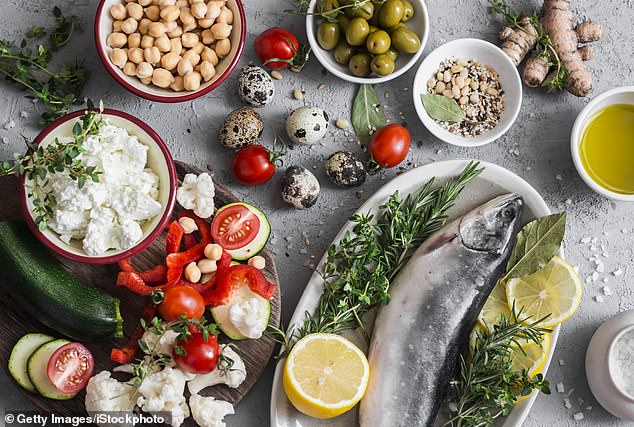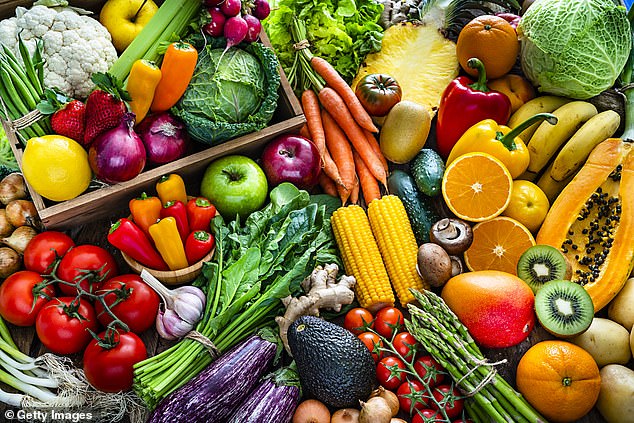Expert Guide to Boosting Your Gray Matter — and the Best Foods for Your Brain
Scientists now know that the brain is constantly rewiring itself, a property called neuroplasticity.
By stimulating the creation and survival of new nerve connections, you increase the size and strength of your brain (also called cognitive reserve), making it more resistant to memory loss and dementia.
To achieve this, you need to challenge yourself mentally and maintain social contacts.
It’s important to keep learning, says Tim Beanland of the Alzheimer’s Society charity – and that means trying new activities regularly. ‘Your brain reprograms itself when it learns a new skill, improving cell connections and making it more resilient,’ he says.
Tim says you’ll benefit most from regularly challenging yourself with different activities and exercises that require concentration, rather than repeating the same puzzles over and over.
The brain is constantly rewiring itself and you need to stimulate the creation of new neural connections by mentally challenging yourself (Stock Image)
He suggests trying the following:
- Volunteer: A 2023 study found that older adults who volunteered were less likely to develop dementia. Researchers at the University of California attributed the results to keeping the brain active, socializing, and feeling a sense of purpose.
- Don’t ask Google:If you can’t remember something quickly, try to figure out the answer yourself instead of looking it up online. This is not conducive to your long-term memory.
- Playing or learning to play an instrumentResearch shows that people who exercise regularly are less likely to suffer from memory loss.
- Learn a language: People who speak more than one language may protect their brains from dementia better than those who speak only one, research shows. Investigate online language resources, including the free Duolingo app, which offers courses in more than 40 languages.
- Ignore the hype around online brain training: ‘You can spend a lot of money on brain training apps. They can be fun, but the evidence that they work is pretty weak,’ says Tim.

People who regularly play an instrument are less likely to suffer from memory loss, research shows (Stock Image)

The Duolingo app offers courses in over 40 languages
TRY THE MIND DIET
People who follow a Mediterranean diet rich in seafood, nuts, fruits and vegetables have a 23 percent lower risk of dementia, regardless of their genetic risk, a 2023 British study found.
A version of the diet, known as the MIND diet (Mediterranean-DASH Intervention for Neurodegenerative Delay), was developed to protect brain health and emphasizes the importance of eating vegetables, olive oil, berries, beans, whole grains, poultry, nuts and fatty fish (at least once a week), while limiting sweets, red meat, cheese and butter.

A Mediterranean diet is rich in seafood, nuts, fruits and vegetables (Stock Image)
REDUCE JUNK FOOD
Ultra-processed foods (UPFs) – such as sugary cereals, ready-made meals and mass-produced bread – are often high in sugar, saturated fat, salt and additives, and low in fibre. These substances have been linked to obesity and heart disease (risk factors for dementia).
Researchers from University College London found that a diet high in UPFs is a “major factor” in obesity, a major risk factor for dementia.
While research into the long-term effects of UPFs is still ongoing, researchers at The Lancet say it is “almost certain” that more links to dementia will come to light.
Enjoy a cup of coffee
“There is evidence that a few cups of coffee a day can protect your brain, but the benefits disappear if you drink more than three,” says Aidan Goggins, a pharmacist and independent consultant for the supplement industry.
Coffee contains a number of brain-protecting substances, including caffeine, polyphenols and trigonelline. These substances can stimulate the brain, protect against tissue damage from free radicals and protect the blood vessels in the brain from oxidation.
There is some evidence that moderate consumption may also help prevent cognitive decline, heart failure, stroke and diabetes, all risk factors for dementia.
If you haven’t been an avid coffee drinker until now, be careful if you want to start later in life: Research shows it may increase the risk of developing mild cognitive impairment, a precursor to dementia, Aidan warns.

There’s evidence drinking a few cups of coffee a day can protect your brain, experts say (Stock Image)
GO GREEN
Broccoli, peas, asparagus, lettuce, beans and whole grains, rich in folic acid, may help prevent Alzheimer’s in old age.
A 2005 study from the University of California found that people who regularly consumed 400 micrograms of folate, or folic acid (a B vitamin crucial for brain health) daily through diet and supplements halved their risk of dementia.
Folic acid is thought to inhibit the activity of the amino acid homocysteine. High levels increase the risk of heart disease, stroke and dementia.
EAT MORE BEANS
Beans and legumes are the richest sources of dietary fiber. Research shows that people with a low-fiber diet have a much higher risk of developing cardiovascular disease, a risk factor for dementia.

Vegetables and beans are thought to reduce the risk of dementia (Stock Image)
Half a can of beans of any kind provides 9 grams of the recommended daily amount of 30 grams.
Fiber is essential for a healthy microbiome, which is believed to play an important role in fighting inflammation in the body.
Nutritionist Rob Hobson suggests adding pulses to bolognese to increase fibre. ‘Don’t forget the baked beans either – but choose a low-sugar version,’ he adds.
